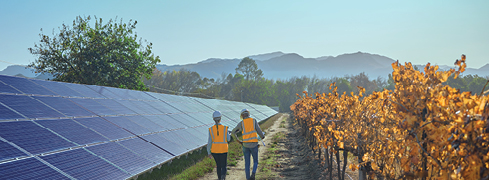
As the world approaches the 2030 deadline for the delivery of the United Nations’ Sustainable Development Goals, the need for sustainable farming and agri-business practices has never been more critical. South Africa’s agricultural sector, a cornerstone of the economy and the foundation on which our nation’s food security rests, stands at a crossroads where the adoption of sustainable methods is not just a choice but a necessity – not just for the industry, but for the country.
However, entrenching sustainability into this vital sector requires a strong commitment by all its stakeholders. More than that, it demands significant financial resources. Historically, various funding facilities have been available to farmers and agri-businesses; however, the achievement of the significant sustainability outcomes required from the sector now hinges on the creation of bespoke finance facilities specifically tailored to drive sustainability objectives within agriculture.
Recognising this, FNB Agriculture has stepped forward with a solution in the form of its newly launched FNB Sustainable Agriculture Loan. Speaking at NAMPO 2024, Gert Breet, Sustainable Agriculture Lead at FNB Commercial, explained that the loan has been specifically designed to support the crucial role agriculture plays in South Africa’s economy and enable agri stakeholders to mitigate the impact their practices have on the environment. “The FNB Sustainable Agriculture Loan is very much a finance tool,” Breet says, “created to empower farmers and businesses to adopt practices that ensure their growth and contribute to the health of our planet.”
The FNB Sustainable Agriculture Loan is a ground-breaking financial product for FNB in that it represents the bank’s tangible delivery on its commitment to supporting the transformation of agriculture and enhancing its contribution to a more resilient and low-carbon economy. The loan encourages a variety of sustainable agricultural practices, from renewable energy projects like solar and biogas to water efficiency and regenerative agriculture.
Notably, it provides repayment terms of up to 10 years with the option of a 12-month interest-only period. It also offers 100% financing with loan-to-value ratios of up to 70%, making it suitable to a wide range of agri-business entities – including existing and new FNB clients – across the entire agricultural value chain.
“We deliberately made the eligibility criteria for this loan as all-encompassing as possible to allow a broad range of farmers and agri-business entities to benefit from its value-adding features,” Breet explains, “and we have streamlined the application process to ensure our clients can quickly access the funds they need to make a real difference in their operations through meaningful investment in sustainable solutions and practices.”
One of the standout features of the loan is its revolving credit capabilities. Once 50% of the loan is repaid, borrowers can request the bank to redraw funds for further sustainable initiatives. The repayment structure also includes options to extend the 12-month interest-only payments and integrate flexible capital repayment schedules – both of which underscore FNB’s understanding that sustainability in agriculture is a long-term commitment that requires adaptable financial support.
Importantly, the FNB Sustainable Agriculture Loan is about more than just money. FNB’s commitment to Environmental, Social and Governance (ESG) principles is evident in the extensive value-adding advisory services FNB plans to launch in the future. Leveraging its national network of agri-finance experts and client relationship managers, the bank provides assistance to clients in navigating the complexities of sustainable agricultural practices.
“Strategic partnerships and support services are integral to the FNB Sustainable Agriculture Loan,” Breet emphasises, “and by working with various partners that have extensive expertise in all areas of sustainable agriculture, FNB aims to provide enhanced support and validation for the sustainability projects we fund.” Breet says that there are many more value adding tools and features currently in development, and FNB clients who have taken up the Sustainable Agriculture Loan will benefit from the opportunity to be early adopters of these features.
Breet explains that the newly launched loan also aligns closely with FNB’s Statement of Intent on Agriculture in which the bank recognises that, while adaptation strategies such as regenerative agriculture are crucial for climate resilience, they often remain out of reach for many farmers due to constraints in capital and knowledge. “By focusing on sustainable finance solutions like this loan, we aim to address these challenges, put climate smart farming practices within reach of a growing number of South African farmers, and facilitate the implementation of best practices across the sector,” he says.
“The FNB Sustainable Agriculture Loan is further evidence of FNB’s long-standing commitment to do much more than provide ‘off-the-shelf’ funding to farmers,” Breet concludes, “but rather invest in a future where farming thrives in harmony with nature, for the benefit of all South Africans.”
INFO SUPPLIED.

